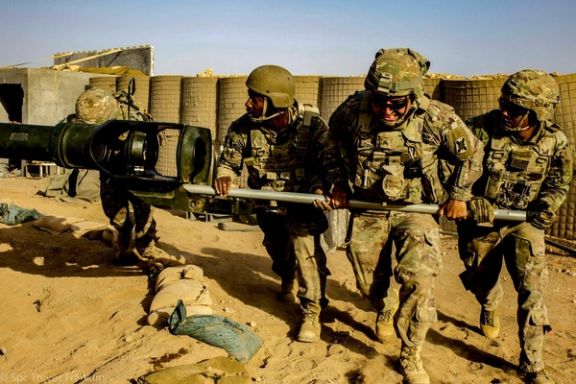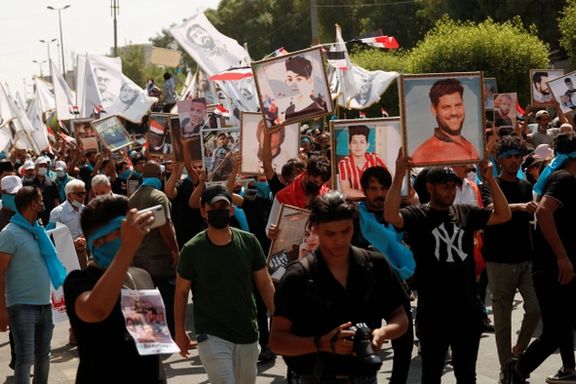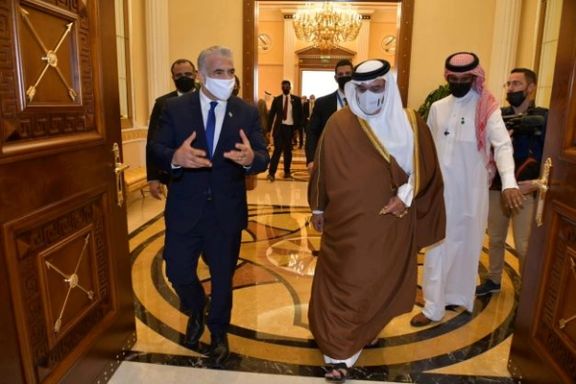Pompeo: The Taliban Knew We Were Serious When They Saw Attack On Soleimani

Mike Pompeo has said Friday that the Taliban took the Trump Administration seriously after the killing of Iran's Qassem Soleimani in 2020.

Mike Pompeo has said Friday that the Taliban took the Trump Administration seriously after the killing of Iran's Qassem Soleimani in 2020.
Former US Secretary of State Mike Pompeo tweeted: "The Taliban knew our government was very serious because they saw our attack on Qassem Soleimani and the elimination of ISIS. "They knew that if they acted in a way that was inconsistent with American interests, we would destroy them."
President Joe Biden has been criticized for the hasty withdrawal from Afghanistan that led to a quick takeover by the Taliban. The Biden administrations says that the decision to withdraw and an agreement with the Taliban was reached by the Trump administration.
Soleimani was killed in a US drone strike in Baghdad on January 3, 2020, ordered by former president Donald Trump, to eliminate impending terror threats, the US said at the time.

A recent pledge by US president Joe Biden that the US would not abandon Kurdish allies in Syria has gone a long way to allay their fears, according to Reuters.
In meetings held in August and September between US officials and the Kurdish-led Syrian Democratic Forces (SDF), Biden’s pledge was conveyed to the Kurds who have played a pivotal role in the fight against the Islamic State group. They are supported by around 2,000 US troops stationed in Syria.
The US military presence in Syria is also needed to curb Iran’s influence in both Iraq and Syria and address the security concerns many US allies – particularly Israel – in the region feel as a result.
The hasty and badly organized US withdrawal from Afghanistan in August prompted fears among Washington’s other allies about the durability of US friendship. Kurdish troops in northeastern Syria, facing multi-pronged opposition from Islamic State fighters as well as the Assad regime and the prospect of Turkish incursion, have felt particularly vulnerable.
The election of Joe Biden in November 2020 raised the hopes that the US would adopt a steadier approach in its dealings with the Kurds in Syria. And it seems that, on appearances at least, the US is willing to do so.
Reporting by Reuters

Iraqis marched in Baghdad Friday to mark two years since mass anti-government protests erupted in the Iraqi capital and southern provinces calling for reform.
Around 1,000 protesters took part in the event in the center of Baghdad, many of them carrying photos of loved ones who were killed by security forces during the protests.
The commemoration comes a week before Iraq plans to hold early elections, which had been a key demand of tens of thousands of protesters who thronged streets and public squares in October 2019 until early 2020.
Demonstrators camped out in the capital's Tahrir Square for months, most of them Iraqi youth decrying endemic corruption, poor services and unemployment.
The movement petered out owing to the government's heavy-handed response and the coronavirus pandemic.
Over 600 people died as security forces used live ammunition and tear gas canisters to disperse crowds.
Now, many among the protest movement are calling for a boycott of the elections scheduled for October 10, convinced that nothing will change.
They decry in particular a string of targeted assassinations against civil society groups and outspoken activists for which no one has been held accountable.
The killings have created a climate of fear and widespread reluctance to take part in the voting, particularly among young Iraqis who constitute the largest group of voters in Iraq.
Reporting by AP

Iran said on Friday that a visit by Israel's foreign minister to Bahrain this week "left a stain" on the Gulf Arab state's rulers that "will not be erased".
Bahrain and Gulf neighbor United Arab Emirates normalized ties with Israel last year in a US-brokered deal known as the Abraham Accords that built on common commercial interests and worries about Iran.
Israeli Foreign Minister Yair Lapid, in a historic visit to strengthen normalization, met Bahraini King Hamad bin Isa Al Khalifa and Crown Prince and Prime Minister Salman bin Hamad Al Khalifa on Thursday. To signal cause against Iran, Lapid toured Bahrain's headquarters of the US Navy's Fifth Fleet, which has faced off with Iranian vessels in recent years.
“We condemn any scheme that bolsters Israel’s destructive presence in the region,” Iranian Foreign Ministry spokesman Saeed Khatibzadeh said in a statement carried by the official IRNA news agency.
“It is unfortunate that Bahrain’s rulers ignore the Zionist regime’s daily crimes against the oppressed but resilient people of Palestine,” Khatibzadeh said, referring to Israel.
“This stain will not be erased from the reputation of Bahrain’s rulers. The people of the region will continue to oppose the process of normalization of ties with the Zionist regime.”
Bahrain, a Sunni Muslim-ruled kingdom, accuses Iran of stoking unrest in Bahrain, a charge that Shi'ite Muslim Tehran denies. The island state, which quashed an uprising led mostly by Shi'ite members of its population in 2011, saw some sporadic acts of protest after the Abraham Accords were signed.
Reporting by Reuters

Israel's foreign minister thanked Bahrain's King Hamad bin Isa Al Khalifa for a "warm and hopeful meeting" on Thursday as part of a landmark trip to the small Gulf state.
Yair Lapid's arrival was the first high-level visit to the country by a senior Israeli official since the signing last year of an agreement to establish diplomatic ties.
"The king's leadership and inspiration led to genuine cooperation and the meeting paved the way for the continuation of the relationship," Lapid said a statement released by the Israeli Foreign Ministry.
Lapid had earlier landed in Bahrain's capital, Manama, for meetings with his Bahraini counterpart and to inaugurate Israel's embassy.
Israel established formal diplomatic relations with four Arab states last year as part of the U.S.-brokered "Abraham Accords."
Lapid has already visited the United Arab Emirates and Morocco and opened Israel's diplomatic offices there since he became Israel's foreign minister in June.
Bahrain's first ambassador to Israel arrived earlier this month and presented his credentials to Israel's figurehead president on the anniversary of the signing of the accords.
The two countries had long enjoyed clandestine security ties over a shared distrust of regional rival Iran, but only last year took the relationship public.
Report by AP

Israeli Foreign Minister Yair Lapid arrived in Bahrain on Thursday on the highest-level official Israeli visit to the Gulf state since the countries established formal relations last year.
Lapid, who landed at Bahrain's international airport in an Israir plane with an olive branch painted on its nose, will inaugurate Israel's embassy in Manama and hold talks with his Bahraini counterpart.
An Israeli Foreign Ministry spokesperson said five memorandums of understanding will be signed, including cooperation agreements between hospitals and water and power companies.
"The main areas in which Bahrain is looking for cooperation have to do with the economy and technology, and a few of the MOUs that will be signed (on Thursday) will be about that," the spokesperson said, without elaborating.
He said 12 memorandums of understanding have been signed so far between the two countries, among them deals relating to transportation, agriculture, communication and finance.
Bahrain and Israel also share concerns over Iran's nuclear program and regional interventions.
Bahrain and Gulf neighbor United Arab Emirates normalized relations with Israel last year in a US-brokered deal known as the Abraham Accords that built on shared business interests and worries about Iran.
"We see Bahrain as an important partner, on the bilateral level but also as a bridge to cooperate with other countries in the region," the spokesperson said.
Report By Reuters